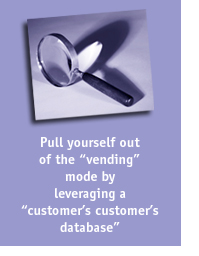
Researching the Customer's Customer
| Продажи | ||||
| Sales.com | ||||
| Preparing... | ||||
by Graham Denton
It stands to reason that before you make a call on a critical customer, you should find out everything you can about that customer's business. To be even minimally prepared, you need to be familiar with current trends in the customer's industry, critical issues that the specific company you're calling on may be facing, and potential alignments between those issues and your company's solutions. The best prepared salespeople -- especially when they're calling on upper level managers -- go in with detailed knowledge in each of these areas so they can serve as true consultants to their customers and prospects.
 To do this
proficiently, says Mack Hanan, you should have access, before every call,
to three databases. Hanan is the author of Consultative Selling,
a best-selling guide for transcending the "vendor" stereotype. In that
book, he describes the three "storehouses of information" that you need
to use as "basic resources for value-based selling to key accounts." You
need an industry database for each industry into which you sell,
a customer database on every key account you manage, and a customer's
customer database on those account's key accounts.
To do this
proficiently, says Mack Hanan, you should have access, before every call,
to three databases. Hanan is the author of Consultative Selling,
a best-selling guide for transcending the "vendor" stereotype. In that
book, he describes the three "storehouses of information" that you need
to use as "basic resources for value-based selling to key accounts." You
need an industry database for each industry into which you sell,
a customer database on every key account you manage, and a customer's
customer database on those account's key accounts.
The first two databases are obvious enough; they're used routinely by every competent selling professional. The third database is a little unusual, yet it's a critical component of consultative selling. In the activity that Hanan contemptuously calls "vending," the salesperson's aim is to grow his own business -- and commissions. In consultative selling, you strive to grow your customer's business by focusing on the two essentials of all business growth: the reduction of costs and the increase of revenues. A consultative seller focuses on achieving results for the customer in these two areas, and only sells product or service as a means to that end.
With that definition in mind, it isn't hard to see why the consultative seller needs a customer's customer database.
As important as it is to understand your customers' internal operations, that's not enough. You also must understand their external activity, that is, their markets, because every internal operation is driven, ultimately, by the way a business confronts the challenge of serving its customers. It's those end customers -- the ones who are two or three removes from you -- who determine whether your immediate customer will be successful. So the more you know about them, the better consultant you can be. "Only when you know your customer's customers," Hanan says, "can you understand the full range of sales opportunities that can be enlarged as well as costs that can be reduced."
There's an additional advantage to this approach that Hanan doesn't mention. The more you understand about your customer's customers, the more likely you are to uncover a cost-reduction or revenue-generating opportunity in their businesses as well. Once you do that, you've positioned yourself to consult with them. Thus, the more you educate yourself about the far reaches of the supply chain, the more chance you have of providing solutions at those "lower" levels.